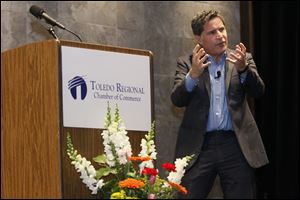
Magazine founder dares leaders to seize new ideas
2/1/2013
Don’t accept being only pretty good, Fast Company magazine founder Bill Taylor tells several hundred people at Thursday’s annual meeting of the Toledo Regional Chamber of Commerce.
It used to be that the strongest companies — the ones with the largest budgets, longest client lists, and biggest marketing budgets — took from the weaker companies.
“That world is over,” said Bill Taylor, an author, entrepreneur, and founder of Fast Company magazine. “Now, the smartest companies take from the strongest companies.”
If a company wants to stand out from its competitors, it has to embrace new ideas that often will change a company’s corporate culture, said Mr. Taylor, who was the keynote speaker Thursday at the Toledo Regional Chamber of Commerce's annual meeting, held at the Premiere Banquet Facility in Toledo.
Mr. Taylor said he recently spoke to a group of executives of small community banks and heard a litany of complaints about why their business was down. He told them about a friend who owns a company that hires mystery shoppers to check out public businesses, and the shoppers had recently shopped a number of banks.
At each bank, a mystery shopper would ask an employee, “‘Why should I do business with you?’ More than two-thirds of the time, the bank employees ... had no good answer,” Mr. Taylor said.
“How can any company expect to outperform the competition when their employees can’t say why their company is better?” he added.
What if the mystery shopper walked into Toledo companies and asked the same question, Mr. Taylor asked the audience. “What do you deliver that nobody else within your field can deliver?"
The problem with too many companies, he said, is that many still think being pretty good at something is enough. But he said being middle of the road is a road to nowhere.
Mr. Taylor said a good example of setting oneself apart is Southwest Airlines, which is in an industry that, historically, has lost more money than it has made.
In 40 years of business, Southwest has never lost money, never had to lay off any employees, Mr. Taylor said. “It did that because it rethought and reimagined why it wanted to be in that godforsaken business,” he said.
Ask Southwest employees what business they are in and they won't say the airline business. They’ll say they're in “the freedom business,” Mr. Taylor said. The company has a corporate vision, a culture, “and a true passion” that trickles down to its lowest employee, he added.
Southwest executives don’t think about what keeps them up worrying at night. They think about what gets them up and going in the morning, Mr. Taylor said.
Mr. Taylor also cited the transformation of DaVita Healthcare Partners, which was on its corporate deathbed in 1999. Specializing in kidney dialysis treatments, DaVita, known then as Total Renal Care Inc., was worth just $1.5 billion, its stock $2 a share. Just 13 years later it is now worth $8 billion, its stock $120 a share.
DaVita CEO Kent Thiry engineered its remarkable turnaround by changing the company’s culture. “He got its people to think of it as a community first, and a company second,” Mr. Taylor said.
Mr. Thiry even let his employees suggest new names for the firm and vote for the best name. He threw a party for the renaming announcement, and employees wrote a company song.
Mr. Taylor said he asked the company’s employees why they even bothered to do that. The answer: Kidney dialysis is a mentally draining job, and the changes gave employees a chance to display their passion.
The lessons of Southwest and DaVita are something every CEO should take as a challenge, Mr. Taylor said. “You can’t let what you know limit what you can imagine,” he said.
Contact Jon Chavez at: jchavez@theblade.com or 419-724-6128.